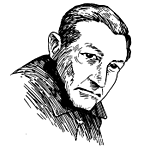In his 1968 essay “On Not Being a Jew,” the novelist Edward Hoagland noted with a touch of resignation that for a writer coming of age in the 1950s, being a well-connected, Deerfield- and Harvard-educated Protestant had not exactly been an advantage, not at a time when Jews were the rage. On the one hand, the Jews were great: Bellow was the best American author since Faulkner; Malamud, “slightly less gifted, pulled even with him in certain short masterpieces”; and there was Philip Roth, of course. But a fair-haired boy could feel ambivalent about the philo-Semitic climate. “In my own case,” Hoagland writes, “my first novel came out about the same month as Sam Astrakhan’s An End to Dying, which was about immigrant family life, shifting from the Ukraine to the garment center. Both were pretty fair books, he was a friend of many of my friends, and I remember being startled and disconcerted by how completely they gave their immediate attention to him.”
Hoagland bore up pretty well under the indignities of being overlooked, save one fact, one slight he could not forgive: “This was being told in print and occasionally in person that I and my heritage lacked vitality, that except perhaps for a residual arrogance the vitality had long ago been squeezed dry—if in fact it had ever existed in thin blood like mine. I was a museum piece, like some State of Mainer, because I could field no ancestor who had hawked copper pots in a Polish shtetl.”
I have always been charmed by this essay, especially by the cheeky suggestion that Hoagland’s treatment was some sort of bellwether for the status of Wasp writers. In general, it seems, the Wasps made out OK. Updike is, along with Roth and Bellow, one of our preeminent men of letters. Pynchon and Barth have decent followings, about as large as they deserve. Richard Yates is back, honored by handsome new editions of his work and a careful new biography. As a prep school alumnus, I have a soft spot for Louis Auchincloss; I wish he had more readers, and I remain convinced that The Rector of Justin will someday be recognized as a classic. Hoagland himself has fared well—well enough to take his revenge on Sam Astrakhan, wherever he is.
In fact, I would be tempted to say that posterity has weighed the Wasp novelists of the 1950s and 1960s more than fairly, were it not for one exception, a writer whose work accepts the premise that Hoagland finds so offensive—that the Wasp heritage lacks vitality, “had long ago been squeezed dry”—yet insists that good literature can still be made of that desiccated condition.
...
You have reached your article limit
Sign up for a digital subscription and continue reading all new issues, plus our entire archives, for just $1.50/month.
Already a subscriber? Sign in





